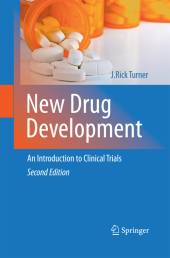 Neuerscheinungen 2014Stand: 2020-02-01 |
Schnellsuche
ISBN/Stichwort/Autor
|
Herderstraße 10
10625 Berlin
Tel.: 030 315 714 16
Fax 030 315 714 14
info@buchspektrum.de |

J. Rick Turner
New Drug Development
An Introduction to Clinical Trials: Second Edition
2. Aufl. 2014. xxv, 256 S. 235 mm
Verlag/Jahr: SPRINGER, BERLIN; SPRINGER NEW YORK; SPRINGER 2014
ISBN: 1-493-90091-9 (1493900919)
Neue ISBN: 978-1-493-90091-6 (9781493900916)
Preis und Lieferzeit: Bitte klicken
Updated and revised, this new edition provides an overview of the design concepts and statistical practices involved in therapeutic drug development. The latest advancements in the realm of drug safety are discussed, and the text includes expanded coverage of clinical trials.
New Drug Development: Second Edition provides an overview of the design concepts and statistical practices involved in therapeutic drug development. This wide spectrum of activities begins with identifying a potentially useful drug candidate that can perhaps be used in the treatment or prevention of a condition of clinical concern, and ends with marketing approval being granted by one or more regulatory agencies. In between, it includes drug molecule optimization, nonclinical and clinical evaluations of the drug´s safety and efficacy profiles, and manufacturing considerations. The more inclusive term lifecycle drug development can be used to encompass the postmarketing surveillance that is conducted all the time that a drug is on the market and being prescribed to patients with the relevant clinical condition. Information gathered during this time can be used to modify the drug (for example, dose prescribed, formulation, and mode of administration) in terms of its safety and its effectiveness. The central focus of the first edition of this book is captured by its subtitle, ´Design, Methodology, and Analysis´. Optimum quality study design and experimental research methodology must be employed if the data collected-numerical representations of biological information-are to be of optimum quality. Optimum quality data facilitate optimum quality statistical analysis and interpretation of the results obtained, which in turn permit optimum quality decisions to be made: Rational decision making is predicated on appropriate research questions and optimum quality numerical information. The book took a non-computational approach to statistics, presenting instead a conceptual framework and providing readers with a sound working knowledge of the importance of design, methodology, and analysis. Not everyone needs to be an expert in statistical analysis, but it is very helpful for work (or aspire to work) in the pharmaceutical and biologics industries to be aware of the fundamental importance of a sound scientific and clinical approach to the planning, conduct, and analysis of clinical trials.
Preface 1.Foreword 2.New Drug Development 3.The Regulatory Environment 4.Drug Discovery 5.Nonclinical Research 6.Designing Clinical Trials 7.Conducting Clinical Trials I: Experimental Methodology 8.Conducting Clinical Trials Ii: Operational Execution 9.Statistical Analysis 10.Statistical Significance 11.Clinical Significance 12.Sample-Size Estimation 13.General Safety Assessments 14.Efficacy Assessment 15.Cardiac And Cardiovascular Safety Assessments 16.Manufacturing Small-Molecule Drugs And Biologicals 17.Postmarketing Surveillance 18.Main Themes And Concluding Comments Reference List Index


